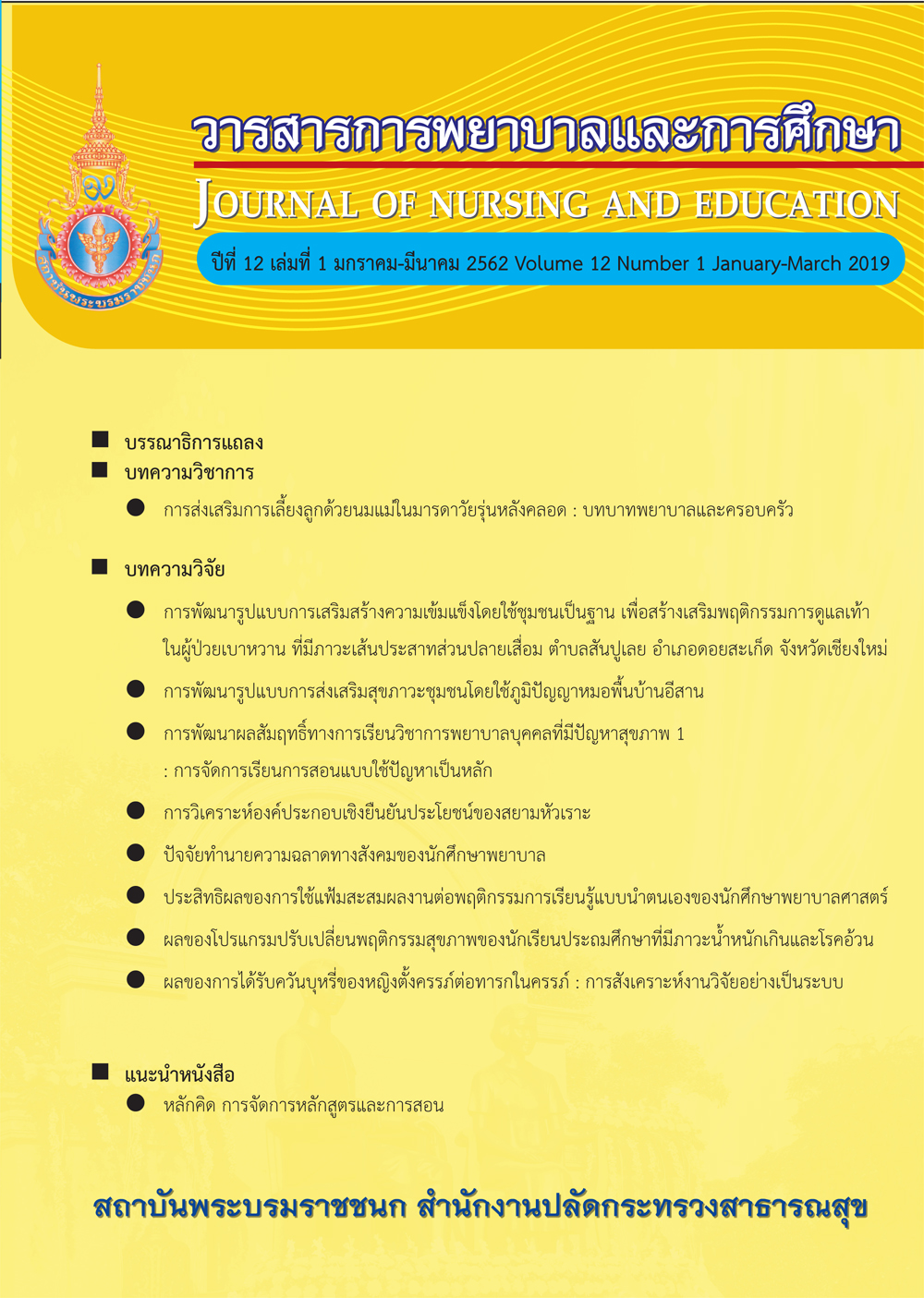ปัจจัยทำนายความฉลาดทางสังคมของนักศึกษาพยาบาล
ปัจจัยทำนายความฉลาดทางสังคมของนักศึกษาพยาบาล
บทคัดย่อ
บทคัดย่อ
ความฉลาดทางสังคมเป็นพื้นฐานสำคัญในการสร้างสัมพันธภาพกับผู้อื่น หากนักศึกษาพยาบาล
มีความฉลาดทางสังคมสูงจะสามารถสร้างสัมพันธภาพและให้บริการด้านสุขภาพกับผู้รับบริการได้เป็น
อย่างดี รวมทั้งสามารถทำงานร่วมกับสหสาขาวิชาชีพได้อย่างมีประสิทธิภาพ การวิจัยเชิงพรรณนา
ชนิดวิเคราะห์ความสัมพันธ์เชิงทำนายนี้มีวัตถุประสงค์เพื่อศึกษาความฉลาดทางสังคมและปัจจัยที่มีอิทธิพล
ต่อความฉลาดทางสังคมของนักศึกษาพยาบาล โดยกลุ่มตัวอย่างเป็นนักศึกษาพยาบาลของมหาวิทยาลัย
แห่งหนึ่งในภาคตะวันออก จำนวน 450 คน ที่ได้รับการคัดเลือกด้วยวิธีการสุ่มกลุ่มตัวอย่างแบบ
แบ่งชั้นภูมิ เครื่องมือวิจัย ประกอบด้วย แบบสอบถามข้อมูลส่วนบุคคล แบบประเมินความฉลาดทางสังคม
แบบประเมินความฉลาดทางอารมณ์ แบบประเมินรูปแบบการเรียนรู้ แบบประเมินความสามารถในการ
ปรับตัวของนักศึกษาพยาบาล แบบประเมินพฤติกรรมติดสนทนาออนไลน์ และแบบประเมินความผูกพัน
ในครอบครัว โดยมีค่าสัมประสิทธิ์แอลฟาของครอนบาคของแบบประเมินที่ 2-7 เท่ากับ .83, .90, .89,
.85, .92 และ .84 ตามลำดับ วิเคราะห์ข้อมูลด้วยสถิติเชิงพรรณนา สัมประสิทธิ์สหสัมพันธ์ของเพียร์สัน
และการวิเคราะห์ถดถอยพหุคูณแบบขั้นตอน
ผลการศึกษาพบว่า นักศึกษาพยาบาลมีความฉลาดทางสังคมสูง โดยมีค่าเฉลี่ยเท่ากับ 106.08
(SD.= 9.04) จากการวิเคราะห์ถดถอยพหุคูณแบบขั้นตอน พบว่า ความฉลาดทางอารมณ์ ความสามารถ
ในการปรับตัว สัมพันธภาพในครอบครัว สามารถร่วมกันทำนายความฉลาดทางสังคมของนักศึกษาพยาบาล
ได้ร้อยละ 52.40 (R2=.524, F=163.796, p<.001) โดยปัจจัยที่มีอิทธิพลมากที่สุด ได้แก่ ความฉลาดทางอารมณ์
(β=.597, p<.01) รองลงมา ได้แก่ ความสามารถในการปรับตัว (β=.145, p<.001) และสัมพันธภาพ
ในครอบครัว (β=.100, p<.001)
ผลการศึกษานี้สามารถเป็นข้อมูลพื้นฐานสำคัญในการจัดกิจกรรมการเรียนการสอนหรือกิจกรรม
เสริมหลักสูตรหรือโปรแกรมส่งเสริมความฉลาดทางสังคมให้กับนักศึกษาพยาบาล โดยมุ่งเน้น
การเสริมสร้างความฉลาดทางอารมณ์ ความสามารถในการปรับตัว รวมทั้งส่งเสริมสัมพันธภาพในครอบครัว
เอกสารอ้างอิง
1. Vinijkul, S., Reansuwong, S., and Sukarate,
P. Relationship between Academic
Environment, Learning Happiness, and
Academic Achievement of Nursing
Students at Kuakarun Faculty of
Nursing, Navamindradhiraj University.
Kuakarun Journal of Nursing, 2014; 21:
7-24. (in Thai)
2. Kaewmart, N. Nursing Students with
Depression. Journal of Faculty of
Nursing, Burapha University, 2013;
21(3): 14-23. (in Thai)
3. Wongkumsin, T. Social Intelligence and
Pro-social Behaviors of Students in
Faculty of Social Sciences at Kasetsart
University. Journal of the Association
of Researchers, 2015; 20(3): 87-98.
(in Thai)
4. Goleman, D. Social Intelligence: The
New Science of Human Relationship.
London: Random House Group, 2006.
5. Albrecht, K. Social Intelligence: The
New Science of Success. San Francisco:
Jossey-Bass A. Wiley Imprint, 2006.
6. Mahasneh, A. M. Learning Styles as a
Predictors of Emotional Intelligence
among Sample of Jordanian University
Students. European Journal of Business
and Social Sciences, 2013; 2(20): 46-55.
7. Kundu, M., Saha, B., Mondal, B.C.
Adjustment of Undergraduate Students
in Relation to Their Social Intelligence.
American Journal of Educational
Research, 2015; 3(11): 1398-1401.
8. Hamissi, J., Babaie, M., Hosseini, M.,
Babaie, F. The Relationship between
Emotional Intelligence and Technology
Addiction among University Students.
International Journal of Collaborative
Research on Internal Medicine & Public
Health, 2013; 5(5): 310-319.
9. Bhatia, G. A Study of Family Relationship
in Relation to Emotional Intelligence
of the Students of Secondary Level.
International Journal of Scientifc and
Research Publications, 2012; 2(12): 1-5.
10. Department of Mental Health. EQ:
Emotional Quotient. Nontaburi:
Department of Mental Health, 2000.
(in Thai)
11. Photong, P., Pumpuang, S, Khachat
S. Stress, Adaptation, and Emotional
Intelligence among the First Year
Nursing Students at Boromarajonani
College of Nursing, Suphanburi. Journal
of Phrapokklao Nursing College, 2011;
22(2): 1-14. (in Thai)
12. Kaur, G., Singh, A. Relationship
among Emotional Intelligence, Social
Intelligence, Spiritual Intelligence and
Life Satisfaction of Teacher Trainees.
International Journal of Teacher
Educational Research, 2013; 2(7): 1-9.
13. Visudtibhan, J.P., Disorntatiwat, P.
Learning Style Preferences of Nursing
Students at Ramathibodi School of
Nursing, Faculty of Medicine, Ramathibodi
Hospital, Mahidol University. Nursing
Journal of the Ministry of Public Health,
2015; 25(1): 70-82. (in Thai)
14. Yongyingyuen, C. Factors Associated with
Emotional Intelligence among Nursing
Students at the Nursing Colleges in
the North East Part of Thailand, the
Ministry of Public Health. [Unpublished
Master’s Thesis]. Mahasarakham:
Mahasarakham University, 2003. (in Thai)
15. Resnick, M.D., Beatman, P.S., Blum,
R.W., Bauman, K.E., Harris, K.M., Jones,
J., Tabor, J., Beuhring, T., Sieving, R.E.,
Shew, M., Ireland, M., Bearinger, L.H.,
Udry, J.R. Protecting Adolescents from
Harm: Findings from the National
Longitudinal Study on Adolescent
Health. JAMA, 1997; 278(10): 823-832.
16. Suwitthaya, K. The Study and
Development of Social Intelligence
for Higher Education Students in the
Southern of Thailand. Sudthiparitha,
2015; 28(86): 127-151. (in Thai)
17. Thongkambunjong, W., ChooChom, O.,
Intasuwan, P., Supparerkchaisakul, N.
Causal Factors and Effect of Internet
Dependency Behavior of High School
Students in Bangkok Metropolis. Journal
of Behavioral Science, 2011; 17(2):
103-119. (in Thai)
18. Nopparat, P. Factors Related to Sexual
Risk Behaviors among High School
Students and Vocational Students.
[Unpublished Master’s Thesis]. Chiang
Mai: Chiang Mai University, 2000. (in
Thai)
19. Moopayak, K., Udomphanthurak, J.,
Kanyapattanaporn, C., Sangchan, C.,
Kaesornsamut, P. Correlation between
Emotional Intelligence and Adaptive
Behaviors of Nursing Students. Journal
of Nursing Science, 2015; 33(1): 55-65.
(in Thai)
20. Auntongtim, S., Laojeerunkul, P.,
Pojpanitchpong, S., and Duangtip,
C. The Adjustment of the First-year
Undergraduate Students of Higher
Educational Institutes in Muang District,
Chiang Rai Province. APHEIT JOURNALS,
2017; 23(1): 19-25. (in Thai)
21. Kanbur, A. A research for Exploring the
Social Intelligence as a Way of Coping
with Work-Family (WFC)/Family-Work
(FWC) Conflict. Journal of Business
Research-Türk, 2015; 7(1): 145-167.
22. Pabian, S., Vandebosch, H. Developmental
Trajectories of (Cyber) Bullying
Perpetration and Social Intelligence
during Early Adolescence. Journal
of Early Adolescence, 2016; 36(2):
145-170.
23. Suliman, W.A. The Relationship between
Learning Styles, Emotional & Social
Intelligence, and Academic Success
of Undergraduate Nursing Students.
Journal of Nursing Research, 2010;
18(2): 136-143.






